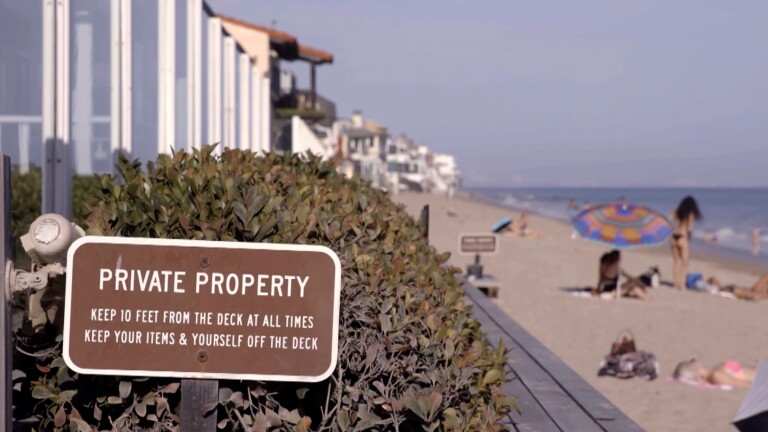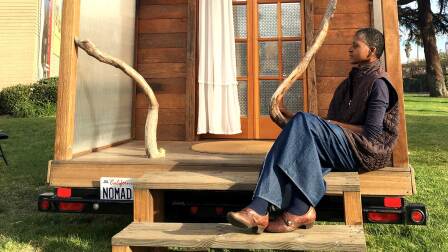54 Kitchens Under One Roof?
Imagine a huge warehouse that holds not just one, but 53 other state-of-the-art kitchens? L.A. Prep in Lincoln Heights is a dream come true for local food producers who are hoping to take their homemade, edible creations to the next level.
Building your own commercial grade kitchen can cost hundreds of thousands of dollars. Getting the health permits and licenses can take months of complicated paperwork. Mott Smith and Brian Albert, the founders of L.A. Prep, thought there had to be a better way. So they bought a 56,000 square foot warehouse and packed it full of permit-ready, commercial kitchens of various sizes, making it easier for entrepreneurs to scale up their businesses in much less time. The leases range from $2000 to $9,000 a month.
From delicious bean and cilantro-filled empanadas at the Empanada Shop, to organic cold press juice and salted white truffle ghee, each kitchen is brimming with new recipes and innovative products that could land in the next major supermarket chain like Ralphs or Whole Foods. There is also a business at L.A. Prep that helps chefs with marketing, labeling and business plans.
Anchor Val Zavala gets a special tour of this food incubator from the founders of L.A. Prep, and meets some of chefs who are changing L.A.'s food culture one kitchen at a time.
Transcript:
Val Zavala: Geez, not much to look at. It's about as a dull a building as you can imagine. But inside it's amazing. Sure enough there were 54 kitchens. People were baking, simmering, churning, and packaging all sorts of unique boutique foods.
Cook 1: We have non-GMO raw gluten free snacks dates and cookies They're delicious.
Cook 2: We make raw organic cold pressed juice at LA Prep.
Cook 3: My company is called "Real Food Devotee." We deliver super nutritious meals to your door in the SoCal area.
Cook 4: Hi I'm Mo. I make spicy cheese dips. I don't know what else to say.
Val Zavala: So, who made this place happen? These guys did. Mott Smith and Brian Albert. They realized that there are tons of people out there making their own jam or pasta or salsa in their home kitchens. But to break out of the small time you would have to build a very expensive, professional, health department certified kitchen.
Mott Smith: We said there's gotta be a better way.
Ruben Frias: Hello. Hi. How are you?
Val Zavala: The Empanada Shop!
Ruben: Yeah! Come on in.
Val Zavala: Ruben used to work for the Walt Disney Company. But his passion was cooking old family recipes from Mexico.
Ruben Frias: You don't wanta overwhelm the empanada with a lot of spices you kind of want a make sure that it’s got a nice blend with the dough and the cheese and the cheese carries a lot of salt, you wanta minimize that. So it’s a balanced strategy.
Val Zavala: He also wanted to go organic which requires even more certifications.
Ruben Frias: Certified organic kitchen means that it’s self contained.
Val Zavala:So nobody can make non-organic food here.
Brian Albert: If you want to be gluten free or if you want to be u, kosher, or a lot of other things that are important to a lot of other food businesses, the only way you can do it is by having your own space.
Val Zavala: And how much would it have cost if he had to build his own kitchen? Hundreds of thousands of dollars and easily a year of wading through complicated bureaucracy.
Mott Smith: You really had to be a masochist to get into the food business.
Val Zavala: The alternative: Lease a ready-to-go kitchen.
Mott Smith: LA Prep is a solution for people who don't have a year and don’t have a half a million dollars in the bank to get started selling their bread or their jam or their ice cream. Exactly.
Val Zavala: Eggs, cheese, cilantro.
Ruben Frias: Yeah and the beans. Um and then we make them with cumin.
Val Zavala: Oh that’s hot.
Ruben Frias: Is it hot?
Val Zavala: Ruben’s business has taken off. They used to make about 500 empanadas a week. Now they make 10 times that many.
Val Zavala: And you can eat it in your car.
Ruben Frias: It’s food to go.
Val Zavala: I’m serious.
Ruben Frias: And healthy, yes.
Val Zavala: There are very few foods that you can eat easily in your car
Ruben Frias: Right.
Val Zavala: And this is a great one. You should have drive-thru empanadas.
Ruben Frias: You know, we'll put that on the list.
Val Zavala: A lot of businesses here are on the cutting edge of food trends. Like this one, Tava Life.
Val Zavala: Hello.
Raquel Tavares Gunsugar: Hello, welcome.
Val Zavala: And you make something called ghee.
Val Zavala: She takes high quality butter and boils it down. The water evaporates and the milk solids rise to the top.
Raquel Tavares Gunsugar: And so what you get is basically a pure liquid gold butter.
Val Zavala: You can use it like cooking oil because ghee can handle high temperatures. Once it's filtered she just pours it into jars and it's ready to go. It doesn't need refrigeration because all the stuff that can spoil has been filtered out.
Raquel Tavares Gunsugar: Fat is the new you know protein essentially. It’s become very trendy to put even butter in your coffee and then whip it. It's very satiating and in fact it’s very good for digestion.
Val Zavala: Their ghee is now in 250 Whole Foods stores. They used to make 1,000 jars a month. Now they make a 1,000 jars a day. And it come in flavors.
Raquel Tavares Gunsugar: Salted white truffle, ghee. I can just eat it.
Tava Life Worker: Yeah you can just eat it I mean truffle’s really good with pasta, it’s really good in any kind of sauce.
Val Zavala: Whoaaaa, it’s rich. This is like concentrate the taste of butter, it’s like make it rich and wonderful and thick and mhmm. Well now that this jar is already open I’m going to have to…
Raquel Tavares Gunsugar: You’re going to have to take it home with you.
Val Zavala: Oh man!
Val Zavala: I’ve gota say I had no idea how intensely food production is regulated. And it's not just the government who does the inspecting.
Brian Albert: A Safeway, a Ralphs, a Whole Foods. They hire third party inspectors to come in and check all things that the health department and more.
Val Zavala: Hi.
Rhys Cazenove: Hi. Come on in.
Val Zavala: Brothee.
Rhys Cazenove: This is Brothee.
Val Zavala: What is brothee?
Rhys Cazenove: Brothee ah creates a range of bone broths. Bone broths are the simmering of bones over 24 to 48 hours
Val Zavala: 24 to 48 hours.
Rhys Cazenove: To create this, this lovely golden liquid.
Val Zavala: For 15 years Rhys built websites for media companies. But he had enough of staring at computer screens all day. So he went back to school, studied nutrition, and jumped on board the bone broth trend.
Rhys Cazenove: We see this as something that can go alongside coffee and green juice. So we’re talking with cafes about stocking them with broth so that their customers can drink ah bone broth out of a coffee cup.
Val Zavala: So really it’s a beverage, it’s not a cooking ingredient.
Rhys Cazenove: Absolutely, yeah.
Val Zavala: Oh my gosh I’ve never heard of that.
Rhys Cazenove: When I began this process at the beginning of the year I was looking at setting up my own kitchen and the costs involved were just astronomical. LA Prep um minimizes those costs and allows us to act a bit more agiley with getting our products out to market.
Val Zavala: For the moment he’s selling mainly at farmer's markets. He's working on getting that coveted wholesalers license. That will let him step up to a higher level and sell to stores and restaurants.
Rhys Cazenove: Ah we’ve developed these flavored ghees that we can infuse with the broths which give it a whole other dimension.
Val Zavala: Oh my goodness!
Rhys Cazenove: You can see it’s got a rich flavor, very low sodium.
Val Zavala: It’s not like the broth that I’m used to dinking.
Rhys Cazenove: No.
Val Zavala: No, it’s way less saltier, more different flavors, like move over Starbucks. Can you imagine instead of Starbucks you have all different flavors of broth?
Rhys Cazenove: That’s what I hope to see in a few years.
Val Zavala: Really?!
Rhys Cazenove: Yeah, absolutely.
Val Zavala: God this place goes on and on. You don't get lost here?
Brian Albert: Mhmm, we used to.
Val Zavala: Yeah.
Val Zavala: Wow, all of this is kitchen, kitchen, kitchen.
Mott Smith: Everything's a kitchen. That's right.
Val Zavala: The rents range from $1500 a month to $9000 a month for a really big space. But the chefs get more than a place to work.
Brian Albert: These are people who are used to working in the middle of the night by themselves, slaving away. All of a sudden here they are and they’ve got a community of almost 50 other food makers going through the same struggles they're going through.
Cook 5: My company is Foodcentricity. And we're a food business accelerator. We help with branding, marketing and financial models.
Cook 6: My name is Salvatore and I work with Crateful. And we deliver ah healthy food to people's house.
Cook 7: We make chocolate that is raw, sugar free, dairy free, made purely of the most potent super foods and tonic herbs.
Cook 4: Hi, I'm Mo, the creator of Spicy Mo’s cheese pips. Ah, I don’t know what else to say.
Val Zavala: Our final stop -- LA Prep's very first tenant, Semolina Pasta.
Leah Ferrazzani: Welcome, welcome!
Val Zavala: Oh my god it smells so good in here!
Val Zavala: Leah had a hard time finding locally made pasta, so she started making her own.
Leah Ferrazzani: This is 100% vegan. It's all certified organic made from a very hard form of wheat called Durham. It’s got the highest protein content of any wheat um that’s available.
Val Zavala: She outgrew her kitchen at home, so she looked into renting a kitchen by the hour. But it takes 24 hours for her pasta to dry. So that wouldn't work.
Leah Ferrazzani: Being able to move in here I was able to quadruple my production right out of the gate.
Val Zavala: Really, quadruple?
Leah Ferrazzani: Um, yeah.
Val Zavala: Wow.
Leah Ferrazzani: All I needed was an employee to do that.
Mott Smith: I kind of like how this turned out here.
Brian Albert: Yeah that’s very nice..
Val Zavala: To get this whole facility off the ground Mott and Brian had to piece together a complicated package of loans, investor money, tax credits. It was risky.
Brian Albert: We really had to create this out of whole cloth.
Val Zavala: The risk is paying off.
Mott Smith: We've got many hundreds of people who have been through the building. Many people who are calling us waiting for the space they want to open up. And so we're very pleased with the demand for the space.
Val Zavala: So pleased that they're on the lookout for another property to build out another LA Prep. As for Mo…
Cook 4: Hi. I'm Mo. The creator of ah Spicy Mo’s cheese dips. All hand-crafter artisan foods, created by me, Mo.
Featuring Interviews With:
- Mott Smith and Brian Albert, co-owners, LA Prep
- Ruben Frias, The Empanada Shop
- Raquel Tavares Gunsagar, Tava Life
- Rhys Cazenove, Brothee
- Leah Ferrazzani, Semolina Artisanal Pasta























